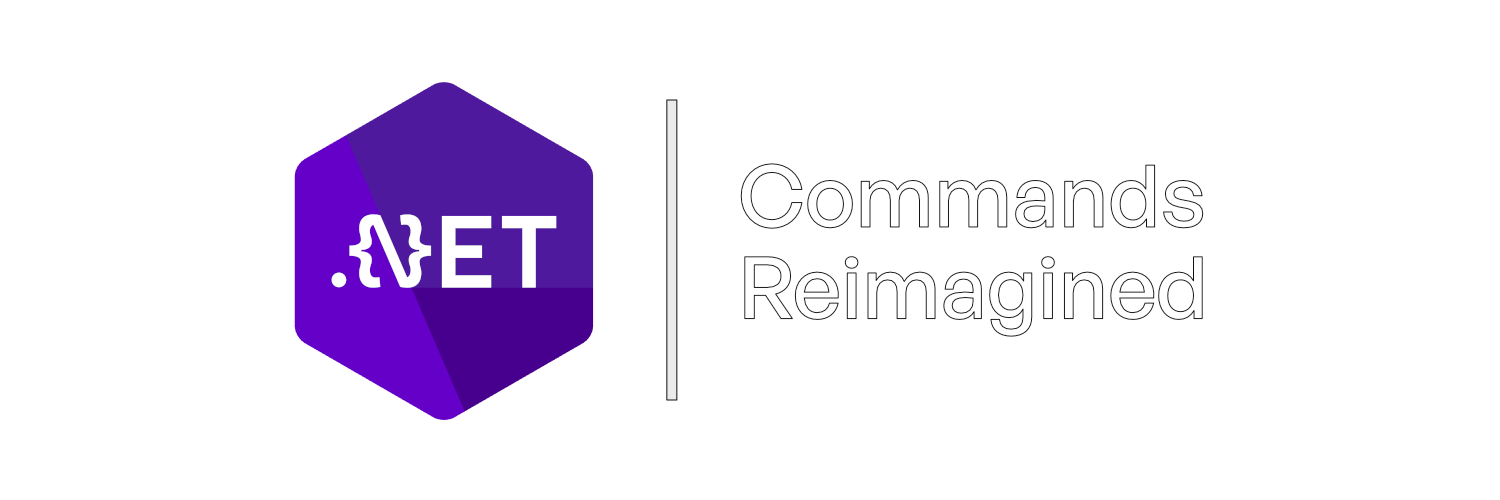Commands.NET.Hosting
2.0.0-alpha.17
See the version list below for details.
dotnet add package Commands.NET.Hosting --version 2.0.0-alpha.17
NuGet\Install-Package Commands.NET.Hosting -Version 2.0.0-alpha.17
<PackageReference Include="Commands.NET.Hosting" Version="2.0.0-alpha.17" />
<PackageVersion Include="Commands.NET.Hosting" Version="2.0.0-alpha.17" />
<PackageReference Include="Commands.NET.Hosting" />
paket add Commands.NET.Hosting --version 2.0.0-alpha.17
#r "nuget: Commands.NET.Hosting, 2.0.0-alpha.17"
#addin nuget:?package=Commands.NET.Hosting&version=2.0.0-alpha.17&prerelease
#tool nuget:?package=Commands.NET.Hosting&version=2.0.0-alpha.17&prerelease

Commands.NET
Consider leaving a ⭐
Do more, with less. With speed, compatibility and fluent integration in mind.
Commands.NET aims to improve your experience integrating input from different sources* into the same, concurrent pool and treating them as triggered actions, called commands. It provides a modular and intuitive API for registering and executing commands.
*Sources can range from command-line, console, chatboxes, to social platforms like Discord, Slack, Messenger & much, much more.
Documentation
Browse the wiki for a full overview of the library.
Installation
Commands.NET is available on NuGet. You can install it using the package manager, or the following command:
dotnet add package Commands.NET
dotnet add package Commands.NET.Hosting
Alternatively, adding it to your .csproj file:
<PackageReference Include="Commands.NET" Version="x.x.x" />
<PackageReference Include="Commands.NET.Hosting" Version="x.x.x" />
The hosting package is optional.
Usage
Running a Command
A command is a method executed when a specific syntax is provided. By creating a manager to contain said command, you can run it with the provided arguments.
using Commands;
var components = new ComponentTree()
{
new Command(() => "Hello world!", "greet");
};
var provider = new ComponentProvider(components);
await provider.Execute(new ConsoleContext(args));
// dotnet run greet -> Hello world!
Creating Command Groups
Command groups are named collections of commands or other command groups. Groups allow for subcommand creation, where the group name is a category for its children.
using Commands;
var mathGroup = new ComponentGroup("math")
{
new Command((double number, int sumBy) => number + sumBy,
"sum", "add"),
new Command((double number, int subtractBy) => number - subtractBy,
"subtract", "sub"),
new Command((double number, int multiplyBy) => number * multiplyBy,
"multiply", "mul"),
new Command((double number, int divideBy) => number / divideBy,
"divide", "div")
};
var provider = new ComponentProvider();
provider.Components.Add(mathGroup);
await collection.Execute(new ConsoleContext(args));
// dotnet run math sum 5 3 -> 8
Creating Command Modules
Command modules are classes that can contain commands or nested command modules, which themselves can also contain (sub)commands.
using Commands;
public class HelpModule : CommandModule
{
[Name("help")]
public void Help()
{
var builder = new StringBuilder()
.AppendLine("Commands:");
foreach (var command in Manager!.GetCommands())
builder.AppendLine(command.GetFullName());
Respond(builder.ToString());
}
}
...
var provider = new ComponentProvider();
provider.Components.Add<HelpModule>();
provider.Components.Add(mathGroup);
await provider.Execute(new ConsoleContext(args));
// dotnet run help -> Commands: math sum <...> math subtract <...> math ...
Dependency Injection
Commands.NET is designed to be compatible with dependency injection out of the box, propagating IServiceProvider throughout the execution flow.
using Commands;
using Microsoft.Extensions.DependencyInjection;
...
var services = new ServiceCollection()
.AddSingleton<MyService>()
.AddSingleton<ComponentProvider>(new ComponentProvider());
.BuildServiceProvider();
var provider = services.GetRequiredService<ComponentProvider>();
provider.Components.Add<HelpModule>();
provider.Components.Add(mathGroup);
await provider.Execute(new ConsoleContext(args), new ExecutionOptions() { Services = services });
Modules can be injected directly from the provider. They themselves are considered transient, being created and disposed of per command execution.
public class ServicedModule(MyService service) : CommandModule
{
}
.NET Generic Host
Alongside dependency injection support in the base package, Commands.NET provides an extension package for the .NET Generic Host, allowing you to integrate Commands.NET into your application with ease.
using Commands.Hosting;
using Microsoft.Extensions.Hosting;
var host = Host.CreateDefaultBuilder(args)
.ConfigureComponents(configure => ...)
.Build();
The extension package supports factory-based command execution alongside scope management, allowing you to manage the lifetime of your commands and modules.
Samples
- Commands.Samples.Core
- Manage, create and execute commands in a basic console application.
- Commands.Samples.Console
- Fluent API's, complex execution flow and workflow expansion.
- Commands.Samples.Hosting
- Integrating Commands.NET into the .NET Generic Host infrastructure.
- Commands.Samples.FSharp
- Use Commands.NET in F# projects.
Benchmarks
Benchmark results are found here.
| Product | Versions Compatible and additional computed target framework versions. |
|---|---|
| .NET | net8.0 is compatible. net8.0-android was computed. net8.0-browser was computed. net8.0-ios was computed. net8.0-maccatalyst was computed. net8.0-macos was computed. net8.0-tvos was computed. net8.0-windows was computed. net9.0 was computed. net9.0-android was computed. net9.0-browser was computed. net9.0-ios was computed. net9.0-maccatalyst was computed. net9.0-macos was computed. net9.0-tvos was computed. net9.0-windows was computed. net10.0 was computed. net10.0-android was computed. net10.0-browser was computed. net10.0-ios was computed. net10.0-maccatalyst was computed. net10.0-macos was computed. net10.0-tvos was computed. net10.0-windows was computed. |
-
net8.0
- Commands.NET (>= 2.0.0-alpha.17)
- Microsoft.Extensions.Hosting.Abstractions (>= 9.0.4)
NuGet packages (1)
Showing the top 1 NuGet packages that depend on Commands.NET.Hosting:
| Package | Downloads |
|---|---|
|
Commands.NET.Http
A package that allows Commands.NET functionality to enable complex, modular HTTP REST communication. |
GitHub repositories
This package is not used by any popular GitHub repositories.
| Version | Downloads | Last Updated |
|---|---|---|
| 2.0.0-alpha.21 | 71 | 20 days ago |
| 2.0.0-alpha.20 | 41 | 20 days ago |
| 2.0.0-alpha.19 | 114 | a month ago |
| 2.0.0-alpha.18 | 116 | a month ago |
| 2.0.0-alpha.17 | 50 | 2 months ago |
| 2.0.0-alpha.16 | 118 | 2 months ago |
| 2.0.0-alpha.15 | 72 | 3 months ago |
| 2.0.0-alpha.14 | 106 | 3 months ago |
| 2.0.0-alpha.13 | 130 | 3 months ago |
| 1.0.0 | 229 | 7 months ago |


